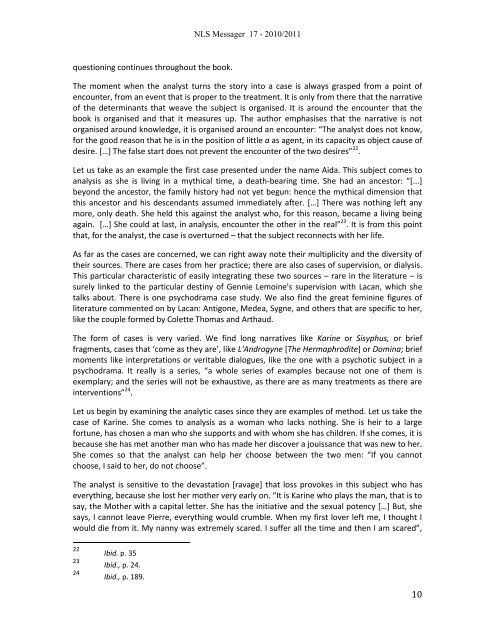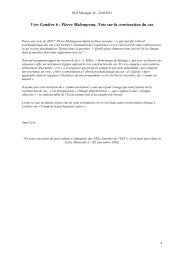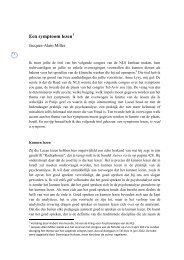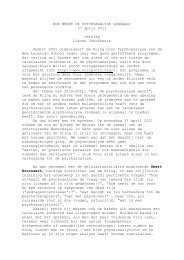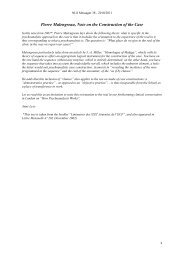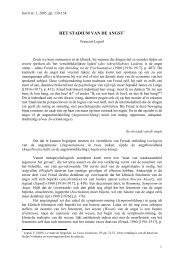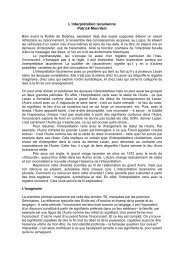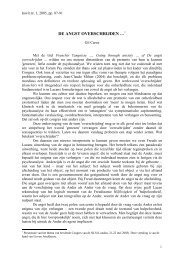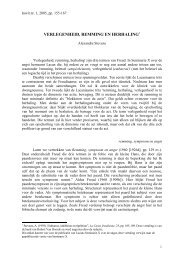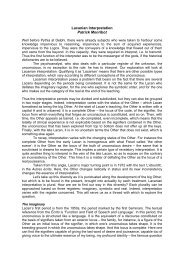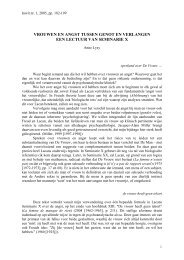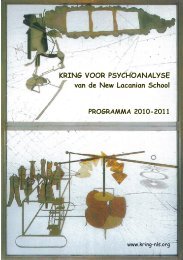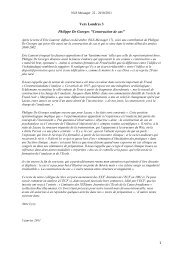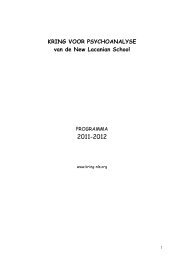Vers Londres 2 Eric Laurent, « Le cas, du - Psychoanalyse Lacan ...
Vers Londres 2 Eric Laurent, « Le cas, du - Psychoanalyse Lacan ...
Vers Londres 2 Eric Laurent, « Le cas, du - Psychoanalyse Lacan ...
You also want an ePaper? Increase the reach of your titles
YUMPU automatically turns print PDFs into web optimized ePapers that Google loves.
NLS Messager 17 - 2010/2011<br />
questioning continues throughout the book.<br />
The moment when the analyst turns the story into a <strong>cas</strong>e is always grasped from a point of<br />
encounter, from an event that is proper to the treatment. It is only from there that the narrative<br />
of the determinants that weave the subject is organised. It is around the encounter that the<br />
book is organised and that it measures up. The author emphasises that the narrative is not<br />
organised around knowledge, it is organised around an encounter: “The analyst does not know,<br />
for the good reason that he is in the position of little a as agent, in its capacity as object cause of<br />
desire. *…+ The false start does not prevent the encounter of the two desires” 22 .<br />
<strong>Le</strong>t us take as an example the first <strong>cas</strong>e presented under the name Aida. This subject comes to<br />
analysis as she is living in a mythical time, a death-bearing time. She had an ancestor: “*...+<br />
beyond the ancestor, the family history had not yet begun: hence the mythical dimension that<br />
this ancestor and his descendants assumed immediately after. *…+ There was nothing left any<br />
more, only death. She held this against the analyst who, for this reason, became a living being<br />
again. *…+ She could at last, in analysis, encounter the other in the real” 23 . It is from this point<br />
that, for the analyst, the <strong>cas</strong>e is overturned – that the subject reconnects with her life.<br />
As far as the <strong>cas</strong>es are concerned, we can right away note their multiplicity and the diversity of<br />
their sources. There are <strong>cas</strong>es from her practice; there are also <strong>cas</strong>es of supervision, or dialysis.<br />
This particular characteristic of easily integrating these two sources – rare in the literature – is<br />
surely linked to the particular destiny of Gennie <strong>Le</strong>moine's supervision with <strong>Lacan</strong>, which she<br />
talks about. There is one psychodrama <strong>cas</strong>e study. We also find the great feminine figures of<br />
literature commented on by <strong>Lacan</strong>: Antigone, Medea, Sygne, and others that are specific to her,<br />
like the couple formed by Colette Thomas and Arthaud.<br />
The form of <strong>cas</strong>es is very varied. We find long narratives like Karine or Sisyphus, or brief<br />
fragments, <strong>cas</strong>es that ‘come as they are’, like L'Androgyne [The Hermaphrodite] or Domina; brief<br />
moments like interpretations or veritable dialogues, like the one with a psychotic subject in a<br />
psychodrama. It really is a series, “a whole series of examples because not one of them is<br />
exemplary; and the series will not be exhaustive, as there are as many treatments as there are<br />
interventions” 24 .<br />
<strong>Le</strong>t us begin by examining the analytic <strong>cas</strong>es since they are examples of method. <strong>Le</strong>t us take the<br />
<strong>cas</strong>e of Karine. She comes to analysis as a woman who lacks nothing. She is heir to a large<br />
fortune, has chosen a man who she supports and with whom she has children. If she comes, it is<br />
because she has met another man who has made her discover a jouissance that was new to her.<br />
She comes so that the analyst can help her choose between the two men: “If you cannot<br />
choose, I said to her, do not choose”.<br />
The analyst is sensitive to the devastation [ravage] that loss provokes in this subject who has<br />
everything, because she lost her mother very early on. “It is Karine who plays the man, that is to<br />
say, the Mother with a capital letter. She has the initiative and the sexual potency *…+ But, she<br />
says, I cannot leave Pierre, everything would crumble. When my first lover left me, I thought I<br />
would die from it. My nanny was extremely scared. I suffer all the time and then I am scared”,<br />
22<br />
23<br />
24<br />
Ibid. p. 35<br />
Ibid., p. 24.<br />
Ibid., p. 189.<br />
10


